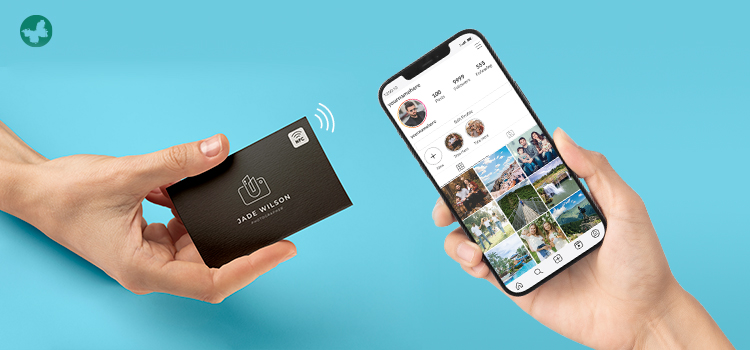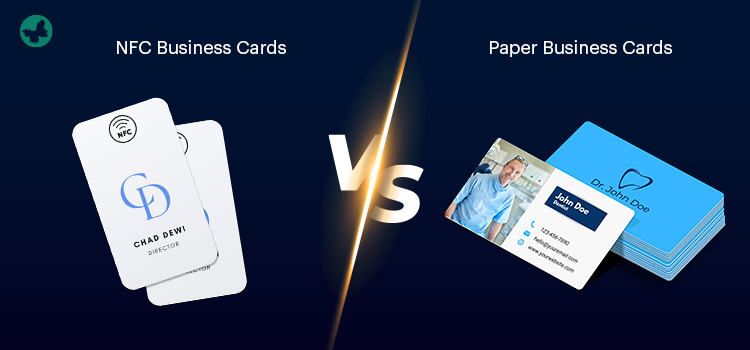Networking is essential for success in today’s linked business environment. Business cards help share contact details and leave a good impression. They are one of the most basic networking tools, but as technology develops, so do the available options. NFC (Near Field Communication) cards have joined traditional paper cards, each with its own set of benefits. This blog post compares the two major types of business cards: NFC vs paper business cards.
Whether you are at a conference, meeting, or social gathering, exchanging business cards is key to building relationships and growing your professional network. ButterflyGP offers a variety of business card shapes and finishes to suit different tastes.
Contents
What Are Paper Business Cards?

Paper business cards are the classic type of business cards that have been used for a long time. They are printed on different types of paper and have various print finishes. They usually include a person’s name, company, job title, contact details, and company logos. These strong marketing tools are the first tangible thing your customer receives from your business. Let’s explore the advantages of paper business cards:
- Acceptable and Familiar: Paper business cards are widely acceptable marketing tools, making them accessible to everyone.
- Cost-Effective and Versatile: They are cost-effective and easy to print, while available in various shapes and textures. Paper business cards offer you many design and customization options to showcase your brand’s identity.
- Personal touch: When you physically give and receive cards, it creates a stronger, more memorable connection. Physical cards and the interactions associated with them are more likely to stick in people’s memories.
What Are NFC Business Cards?

NFC business cards are a modern and high-tech option instead of paper business cards. They use Near Field Communication tech that lets devices communicate wirelessly when close together. Let’s review the advantages of NFC business cards:
- Technological capabilities for wireless communication: NFC business cards make it easy to share information quickly. All you have to do is tap the card on a device that has NFC.
- Enhanced storage capacity for information: NFC technology gives you lots of space to store extra information on your business card. This means you can include more details.
- Tracking your customers’ activities: Monitor and evaluate the impact of your smart business cards. You can see how many new relationships your company has created based on specific people and departments.
NFC vs Paper Business Cards—Key Differences
When comparing paper business cards and NFC business cards, it’s important to consider factors like cost, how easy they are to use, and how flexible they are to design. The following table compares the key features of paper and NFC business cards to help you recognize the differences better:
| Feature | Paper Business Card | NFC Business Card |
| Universal Accessibility | Paper cards are always available and don’t require a smartphone or internet connection. | NFC cards eliminate the need to write down information by enabling quick and simple contact information sharing with a single tap. |
| Professionalism | Paper cards with a strong design can make an impression and aid in people remembering your contact details or business. | NFC cards can be made from high-quality, long-lasting materials to provide a polished and long-lasting impression. |
| Customer Connection | Paper cards promote face-to-face communication and are a useful tool for fostering connections. | NFC cards can connect to websites, portfolios, and online profiles, giving users an engaging and interactive experience. |
| Physical Touch | For certain people, the tactile experience that paper cards provide is superior to that of digital alternatives. | The convenience of digital technology and the tactile feel of conventional cards are combined in NFC cards. |
| Design | Paper cards can be made to match your brand identity using a range of materials, finishes, and designs. | NFC cards can be made to fit specific tastes and brand identities using a variety of materials and designs. |
| Brand Impact | Your brand identity can be strengthened, and a lasting first impression can be made with a well-designed paper card. | NFC cards offer a unique opportunity to showcase a brand’s identity and values through personalized designs and online profiles. |
| Affordability | Printing paper cards can be less expensive initially than developing and maintaining a digital card app. | Long-term cost savings can be substantial when managing physical inventory and reprinting cards are eliminated. |
| Environmentally Conscious Options | Recycled paper can be used to print paper cards, lessening the environmental impact of paper production. | Recycled materials or environmentally friendly substitutes like wood or biodegradable materials can be used to create NFC cards. |
Why Paper Business Cards Are a More Useful Choice?

Both types of business cards have their own advantages and disadvantages. However, some key features make paper business cards more useful than NFC cards, including:
- Ideal Connection: Regardless of the technological proficiency of your clients, they make sure your contact details are successfully shared with them all the time.
- Greater Brand Recall: The tactile feel and eye-catching layout of a well-printed business card leave a more enduring and memorable impression.
- A Touch of Class: A superior paper card shows professionalism and attention to detail, which can improve the perception of your company.
- Perfect Accessibility: They are a reliable tool that is independent of software, batteries, and network connectivity.
- The Power of Physical Presence: A physical card makes a statement and adds a warm, individual touch in a digital world.
Conclusion
In conclusion, even though NFC business cards have technological features and can hold more information, paper business cards are still the better choice for making connections and networking. The personal feel, simplicity, and availability of paper business cards are more important than the benefits of NFC technology.
